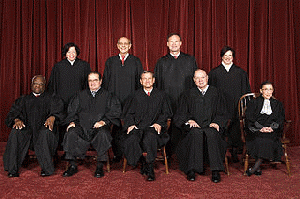Reprinted from Consortium News

US Supreme Court
(Image by (From Wikimedia) Steve Petteway, Collection of the Supreme Court of the United States / Roberts Court (2010-) - The Oyez Project, Author: See Source) Details Source DMCA
Confirming Frederick Douglass's adage, "Power concedes nothing without a demand," prisoners held in solitary confinement for many years in California have won an unprecedented victory. After three hunger strikes, in which tens of thousands of California inmates participated, and a federal class action lawsuit filed on behalf of prisoners by the Center for Constitutional Rights (CCR), a landmark settlement was reached. It effectively consigns indefinite solitary confinement in California to the dustbins of shameful history.
More than 500 prisoners had been held in isolation in the Security Housing Unit (SHU) at Pelican Bay prison for over 10 years, and 78 of them had been there for more than 20 years. They spend 22 to 24 hours every day in a cramped, concrete, windowless cell, and are denied telephone calls, physical contact with visitors, and vocational, recreational, and educational programs.
Now California prisoners will no longer be sent to the SHU solely based on allegations of gang affiliation, but rather based on infraction of specific serious rules violations. Prisoners will only be put in solitary confinement if they commit a serious offense such as assault or murder in prison, and only after a due process hearing.
And they will be put into solitary for a definite term -- no more indeterminate solitary confinement. An estimated 95 percent of California prisoners in solitary confinement based solely on gang affiliation (about 2,000 people) will be released into the general prison population.
The settlement also limits the amount of time a prisoner can spend in the SHU, and provides a two-year step-down program for transfer from SHU to general population. It is estimated that between 1,500 and 2,000 prisoners will be released from SHU within one year of this settlement.
"California's agreement to abandon indeterminate SHU confinement based on gang affiliation demonstrates the power of unity and collective action," the plaintiffs said in a joint statement. "This victory was achieved by efforts of people in prison, their families and loved ones, lawyers, and outside supporters."
The plaintiffs in Ashker v. Governor of California argued that California's use of prolonged solitary confinement constitutes cruel and unusual punishment in violation of the Eighth Amendment to the U.S. Constitution, and denies the prisoners the right to due process.
The federal district court judge found that prolonged solitary confinement had deprived the plaintiffs of "normal human contact, environmental and sensory stimulation, mental and physical and health, physical exercise, sleep, nutrition, and meaningful activity" which could constitute cruel and unusual punishment.
Although no U.S. court has yet ruled that solitary confinement violates the Eighth Amendment, Justice Anthony Kennedy indicated in a concurring opinion in June that he would likely entertain such an argument in the future. Commenting on the case of a man who had been isolated for 25 years in California, Kennedy told the U.S. Congress in March that solitary confinement "literally drives men mad."
Indeed, after visiting Eastern State Penitentiary in Philadelphia in 1842, Charles Dickens noted, "The system here, is rigid, strict and hopeless solitary confinement. I believe it ... to be cruel and wrong " I hold this slow and daily tampering with the mysteries of the brain to be immeasurably worse than any torture of the body." Dickens felt that isolation of prisoners was a thing that "no man had the right to inflict upon his fellow creature."
Juan Mendez, the U.N. Special Rapporteur on Torture, concluded that solitary confinement for more than 15 days constitutes torture. He wrote that prolonged solitary confinement violates the Convention Against Torture and Other Cruel, Inhuman, or Degrading Treatment or Punishment, as well as the International Covenant on Civil and Political Rights (ICCPR). The United States has ratified both of these treaties, making them part of U.S. law under the Supremacy Clause of the Constitution.
Ireland refused to extradite a man to the United States to face terrorism-related charges earlier this year. The High Court of Ireland worried that he might be held in indefinite isolation in a Colorado "supermax" prison, which would violate the Irish Constitution.
Between 80,000 and 100,000 people are held in some type of isolation in U.S. prisons on any given day, generally in supermax prisons, in 44 states and the federal system. Yet there is no evidence that solitary confinement makes prisons safer, the Government Accountability Office determined in 2013.
Solitary confinement exacerbates mental illness. In M adrid v. Gomez, a U.S. federal court judge wrote that for those with diagnosed mental illness, "placing them in [solitary confinement] is the mental equivalent of putting an asthmatic in a place with little air to breathe."
Professor Craig Haney described the deprivation of basic human needs of social interaction and environmental stimulation as a "painfully long form of social death."
(Note: You can view every article as one long page if you sign up as an Advocate Member, or higher).





